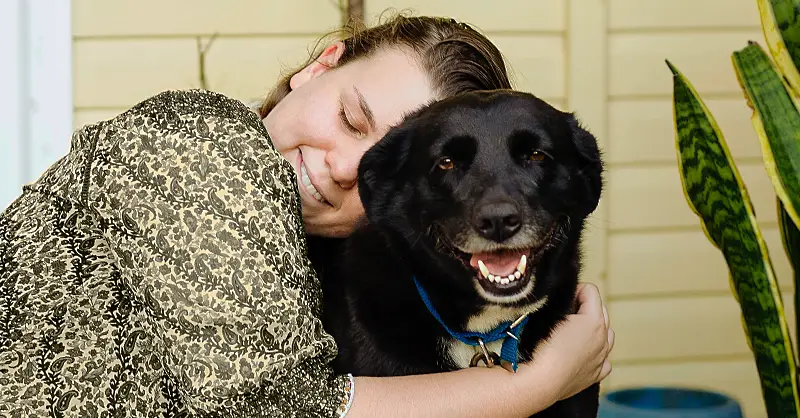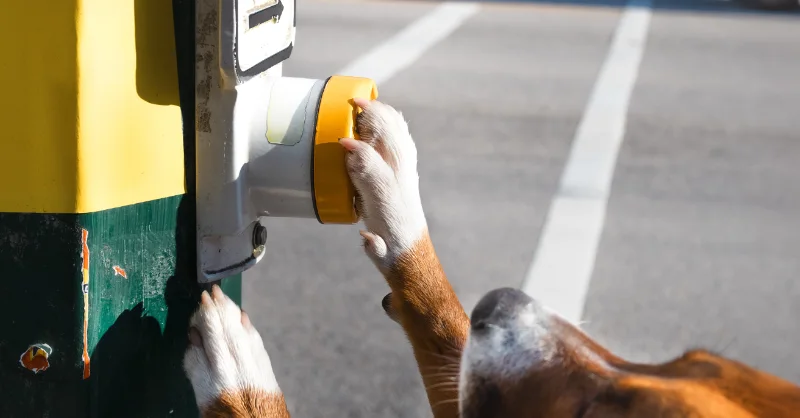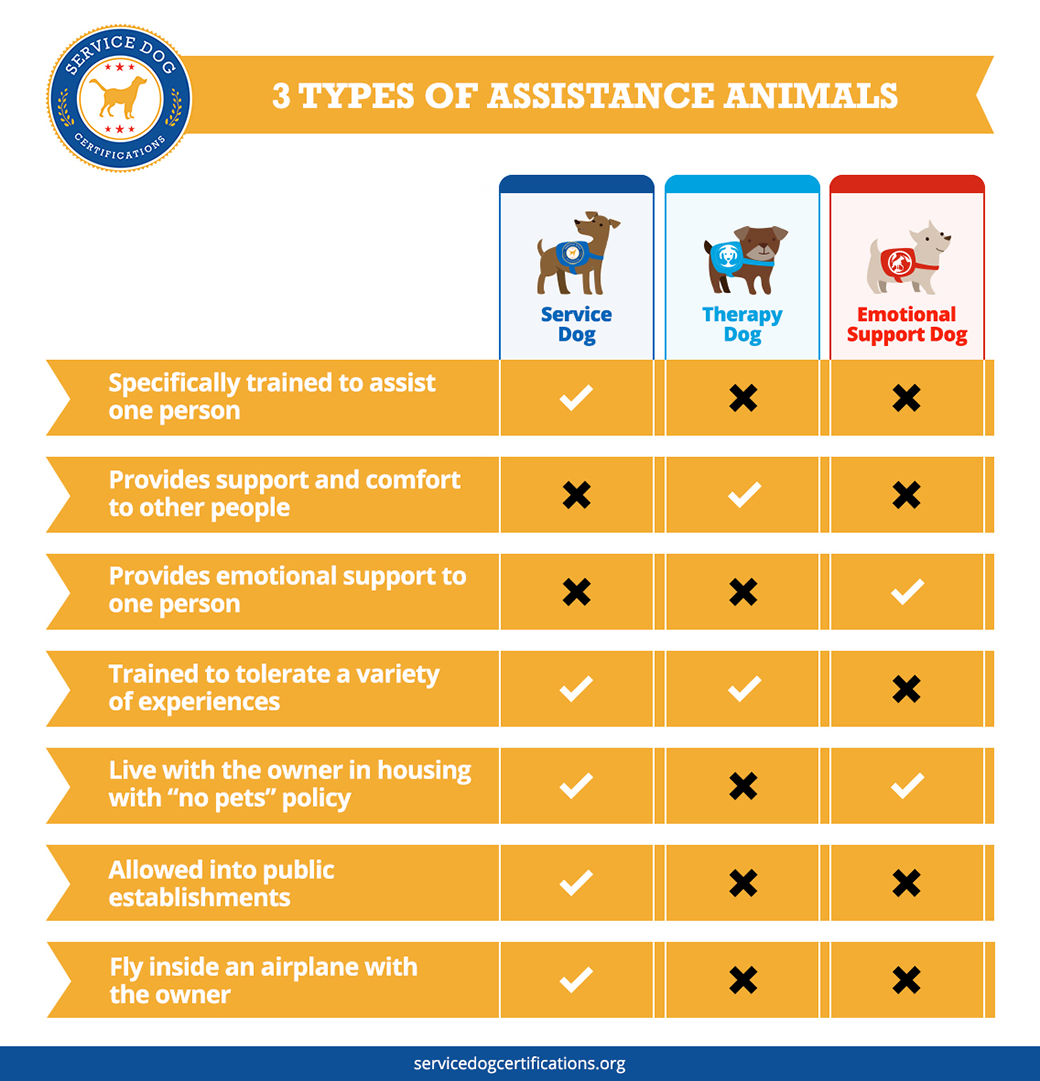Home Page › Blog › Who Can Get a Psychiatric Assistance Dog
Who Can Get a Psychiatric Assistance Dog

You’re probably familiar with service dogs that assist people with physical challenges, like guide dogs for people with vision impairments. They’re easy to spot because their handlers typically have noticeable disabilities. However, some service animals work with people who have invisible disabilities. One example is a psychiatric assistance dog. You might wonder, “What’s a psychiatric assistance dog?”, and “Who can get a psychiatric assistance dog?” We’ll answer these and other questions for you below.
What is a Psychiatric Assistance Dog?
Some disabilities are readily identifiable, as in the case of someone with a wheelchair or an amputee. Others, however, have disabilities or illnesses that aren’t visible from the outside. Psychiatric conditions, for example, are a type of invisible disability. Rather than having an obvious disability, psychiatric disabilities aren’t immediately apparent. Psychiatric assistance dogs — also known as psychiatric service dog (PSD) — are as vital as service dogs for amputees or the vision impaired; the difference is the disability they assist with isn’t readily apparent.
A psychiatric assistance dog performs tasks that their handler can’t do for themselves. Here are a few functions that a psychiatric assistance dog may be trained to perform:
- Navigate through crowds to find a safe area in times of psychological distress.
- Act as a buffer between their handler and people or places that are potentially upsetting.
- Retrieve medication from a location not accessible by their handler.
- Search rooms before their handler’s entry, typically performed for people with post-traumatic stress disorder (PTSD).
- Prompt their handler to perform routine activities of daily living, like grooming or eating.
- Interrupt and redirect a handler who has obsessive-compulsive or self-harm behaviors.
- Provide tactile stimulation or pressure therapy for people who suffer from anxiety or PTSD.
What Conditions Qualify for a Psychiatric Assistance Dog?
Any mental disability or emotional disorder may qualify for a psychiatric assistance dog, as long as there is a task that the animal can perform for its handler. However, the job must be
- a necessity for safety or day-to-day functioning,
- directly related to the disability, and
- not something the handler would otherwise be able to do for themselves.
The following are a few examples of conditions that a psychiatric assistance dog could assist with:
- Clinical Depression
- Anxiety
- Phobias
- Bipolar Disorder
- Obsessive-Compulsive Disorder
- PTSD
- Schizophrenia
- Panic Attacks
- Autism

Is a Psychiatric Assistance Dog the same as a Therapy Dog or Emotional Support Animal?
The short answer is “no.” Although therapy dogs and emotional support animals do help people and provide comfort, they don’t receive service dog training. In contrast, psychiatric assistance dogs receive extensive training to perform a specific task. They also pass a public access test to act appropriately in public areas and are exceptionally well-behaved. Although PSDs are typically dogs, they are not like regular pets; they perform an essential function for which they undergo months’ worth of training.
More importantly, psychiatric assistance dogs are protected under the Americans with Disabilities Act (ADA) and can accompany their handler almost anywhere. PSDs can enter areas where pets, therapy dogs, and emotional support animals are not allowed. Because service dogs are vital to their handler’s well-being, according to federal laws, they are also allowed to:
- Live with their handlers in “no pets allowed” housing areas.
- Enter restaurants, hospitals, or theaters where other animals are prevented from entering.
- Fly with their handlers in the cabin of an airplane under the Air Carrier Access Act.
Can I Get a Psychiatric Assistance Dog?
First and foremost, you must have a diagnosable psychiatric condition if you would like a psychiatric assistance dog. Second, you must have one or more vital tasks in mind that a PSD can accomplish for you. Speak with a licensed mental health professional or physician to see if a psychiatric assistance dog could improve your quality of life and work for you.
Do you already have a dog that you’d like to train? Not all dogs are fit to be service dogs. Your dog should be eager to learn and respond to commands readily. Dogs that are anxious or fearful don’t typically perform well as service animals.
Can I Care for a Service Animal?
The last question requires an honest answer from yourself. You and your mental healthcare provider may want to discuss your ability to care for psychiatric assistance dogs. Despite their intelligence and training, a PSD still needs daily feedings, grooming, and routine veterinary care. It’s important to determine whether the time and financial costs of a service animal is not beyond what you can provide.
Take good care of a psychiatric assistance dog so it can take good care of you.
See if your mental or emotional disability qualifies for a psychiatric assistance dog. Get an PSD Letter assessment from a licensed medical professional.
About the Author: The writing team at Service Dog Certifications is made up of folks who really know their stuff when it comes to disability laws and assistance animals. Many of our writers and editors have service dogs themselves and share insights from their own experiences. All of us have a passion for disability rights and animals.
2 comments
Leave a Reply Cancel reply
Latest Posts

The Fair Housing Act Explained for Assistance Animal Owners
The Fair Housing Act (FHA) is a federal law in the United States that prohibits discrimination against people who need a support animal for their physical or mental health. The FHA applies to landlords in all 50 states. Under the Fair Housing Act, if you need a service dog or an emotional support animal, your […]

Read More

How a Service Dog Knows When It’s Time For You to Take Medicine
Service dogs can help their handlers by reminding them to take medication. These highly trained dogs know when it’s time for their handler to take medicine through routine recognition, alarm responses, scent detection, and awareness of physical and behavioral cues. Training a service dog to do this is one of the many service dog tasks […]

Read More

The Ultimate Guide to Service Dog Tasks: A Comprehensive List by Disability
Service dogs are remarkable animals trained to assist individuals with disabilities by performing various tasks. According to the Americans with Disabilities Act (ADA), a dog can become a service dog if it has been trained to perform a task that helps with the handler’s health condition. Service dogs can help with physical disabilities as well […]

Read More










I am a 100% disabled through the VA I am diagnosed with chronic depressive disorder and anxiety I have a dog now he’s wonderful for me at home and in public he’s not a trained PSD dog but I was wondering if he could get qualified he already knows when I’m feeling anxious so very depressed he’s there for me. Could you help me with this?
To qualify as a psychiatric service dog, your dog must be trained to perform a task or job relating to your mental health disability. We do not offer training services, but we can help with an optional PSD letter if you are seeking one: https://www.servicedogcertifications.org/psd-letter/